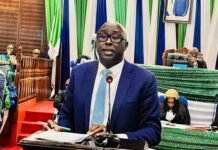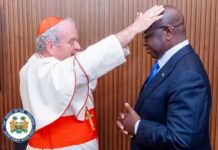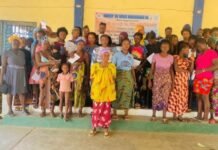By Amin Kef (Ranger)
In a recent interview with US Ambassador David Reimer on Radio Democracy 98.1, discussions regarding the future course of the APC (All People’s Congress) party in Sierra Leone have gained significance. Cornelius Oguntola Melvin Deveaux, a prominent figure within the party, underscores the importance of considering Ambassador Reimer’s insights as the party navigates its way out of its current challenges.
Ambassador Reimer’s stance differs notably from a previous diplomatic incident involving Ambassador Michael Schulenberg in 2012. Unlike Schulenberg, who faced diplomatic repercussions for allegedly interfering in Sierra Leone’s political landscape, Reimer’s interview reflects a balanced and informed approach to the country’s affairs. Deveaux asserts that likening Reimer’s situation to Schulenberg’s would be unjust and counterproductive.
From the interview, four key points emerge that hold crucial implications for the APC’s members and its political strategy going forward:
Recognition of President Bio: Ambassador Reimer unequivocally acknowledges President Julius Maada Bio as the legitimate leader of Sierra Leone. This stands in contrast to assertions by some APC members who questioned the legitimacy of Bio’s presidency. The US Ambassador’s position aligns with constitutional provisions defining the presidency, emphasizing the need for the party to acknowledge this reality.
Timeline for Elections: Reimer confirms that the next elections in Sierra Leone are scheduled for 2028. This clarity should guide the APC’s strategic planning and actions leading up to the upcoming polls.
Boycott Not the Best Option: The APC’s previous decision to boycott governance is challenged by Ambassador Reimer, who suggests that this stance may not serve the party’s best interests. This insight calls for a reconsideration of the party’s approach to engagement and participation in governance.
Electoral System Review: Reimer underscores the importance of addressing integrity deficiencies in the electoral system to enhance the conduct of future elections. This reform-oriented perspective encourages the APC to contribute constructively to electoral improvements.
Deveaux urges APC members to recognize these points and the broader political realities they represent. He emphasizes that acknowledging President Bio’s legitimacy is not contingent on congratulatory messages from foreign powers or the opposition’s participation in governance. Instead, it is anchored in constitutional provisions.
In light of this, Deveaux urges the party to move beyond internal disagreements and focus on its future trajectory. He critiques the current APC de-facto leadership for clinging to positions without democratic mandates, which impedes progress and hampers the party’s effectiveness. He highlights the need for internal reconciliation, unity, and adherence to constitutional processes to facilitate growth.
Deveaux also emphasizes the importance of tackling legal challenges, promoting inclusivity, and preparing for the 2028 elections. He suggests the formation of an unbiased committee in collaboration with relevant institutions to manage the party’s affairs and ensure transparent elections of new executives.
In summary, according to Deveaux, Ambassador Reimer’s interview serves as a guidepost for the APC’s rejuvenation. The party is encouraged to embrace President Bio’s legitimacy, reposition itself as a credible opposition, engage in progressive electoral reforms and contribute to Sierra Leone’s stability on the international stage.
He concluded that with these insights in mind, the APC has an opportunity to chart a more effective and successful path forward.





Greeings fellow Sierra Leoneans, distinguished ladies and gentlemen.
Bambay Lansana Kamara (Pizarro.)
Please permit to respond to assessment of this article by Amin Kef (Ranger) where, I find issues with some of his assessment of Ambassador David Reimer’s interview on 98.1.
Ladies and gentlemen, I want to disagree with the statement Mr. Amin Kef (Ranger) made that “From the interview, four key points emerge that hold crucial implications for the APC’s members and its political strategy going forward:
Recognition of President Bio: Ambassador Reimer unequivocally acknowledges President Julius Maada Bio as the legitimate leader of Sierra Leone. This stands in contrast to assertions by some APC members who questioned the legitimacy of Bio’s presidency,” especially using the word “unequivocally acknowledges President Bio and attempting to contrast his message with that of the A.P.C.
I challenge the word unequivocally because the premise of the interview with Ambassador Reimer is because the subject for the interview itself involves controversies to which, Ambassador Reimer stated, “the US government has raised “questions about the integrity and the credibility of the results” announced by the Electoral Commission of Sierra Leone (ECSL) in June, which saw President Julius Maada Bio re-elected.
“The United States is concerned about irregularities in the results that were announced by the ECSL, International observers had noted “statistical inconsistencies” and condemned a “lack of transparency” in the ballot count and continued, A national observation group also found significant discrepancies between voter results for presidential, parliamentary and local council elections.
On his view about the way forward, he sees equivocal disagreement in appointing the Vice President who was a candidate to oversee an election review committee therefore, he suggested, an “outside, independent” investigation into the election.’
To say that “Ambassador Reimer unequivocally acknowledges President Julius Maada Bio as the legitimate leader of Sierra Leone,” to me is misleading and unfair to the interview and Ambassador David Reimer whose stance was, in diplomatic spheres indicates “do the right thing for your country to forward democracy because the advice he gave to the A.P.C. was that they should participate because for a nation to be a democracy, such a country has to have two parties.
I am doing this to admonish us all to give correct information to readers so as to arm them with such correct information to analyze to give them opportunity to come-up with the best solution for Sierra Leon.